Thursday, March 27
The Trans-Malawi Road Rally
|
Blantyre, Malawi
|
Paul, Dunstan, and I meet for breakfast. Paul and Dunstan arrive first and take a low table. I can't get my legs under it, so I have to eat sidesaddle. Dunstan is amused at my discomfort, but he admires my suit. Paul and I are dressed in our best (or in Paul's case, the best available since he didn't pack a suit) because a television crew will be covering this morning's meeting of the BMI board of trustees, of which Paul is a member. Dunstan leaves for another appointment while Paul goes back to his room to go over the notes for the presentation he's making to the board. I linger over breakfast and have a couple extra cups of tea.
Margaret sends a car to pick up Paul and me and take us to BMI. It's only two blocks from the hotel, but we don't know which two blocks. The driver drops us off at one of the newest buildings in town, and we make our way through an eager but polite phalanx of sidwalk vendors and upstairs to the BMI offices. The interiors are quite modern and comfortable, although the air conditioning doesn't cool all of the rooms.
Margaret greets us and introduces us to her staff. The television crew is already here and ready to interview Paul and Margaret. They all discuss strategy and find a good place to work while I unpack my equipment. I get a couple pictures and listen in as Paul gives a long, rambling answer to a short question. How long and rambling was it? Even Paul concedes only a few minutes later that he was "all over the place" in his attempt to describe his role at BMI. Margaret's interview is next, and she asks the crew to set up in her office so she can be taped at her own desk. After getting her picture, I set up Paul's presentation. I'll be using my ThinkPad and a projector to show some slides; since there's no room to set up the equipment in the board's meeting room, I prepare a room across the hall. The camera crew leaves without asking to interview me.
The board meeting gets underway. I wait in the other room; after about an hour the board arrives to see Paul's presentation. Paul presents his material in an organized and entertaining way, and the presentation is well received. By the time he finishes, it's time for lunch, so we all pile into various waiting cars and go off to "the club," as Dunstan puts it. "The club" is indeed a posh private club in a large and elegant colonial-era building, the sort of place that makes you look for a "Cecil Rhodes slept here" plaque.
We're ushered into a private dining room. There we find a large round table prepared for us, comfortable seats, and air conditioning. My relief at finding working air conditioning for the first time today is exceeded only by my angst upon hearing one of the board members ask that it be turned off. This is not my party, so I silently defer to the majority, who obviously are accustomed to higher temperatures than I.
The menu features many appealing dishes. Dunstan recommends the guinea hen. Although nobody else does (not even Dunstan), I follow his advice. Our group engages in easy, rambling conversation about a variety of topics as we eat our appetizers. When our main courses arrive, talking gives way to serious eating. The guinea hen is splendid and strange: two delicious pieces of tender breast meat and one dark piece. But a piece of what? Because the serving is large, accompanied by steamed vegetables and fried potatoes, and I prefer white meat to dark, I eat all the breast meat and side dishes before tackling the dark. The texture is strange - the surface looks more like rock than meat - and I find it impossible to cut with a knife. After examining it further, I'm not sure if it's really part of my meal or part of the kitchen equipment. I leave it, and it disappears when the waiter comes to clear the table.
As we're finding everywhere in Malawi, service is slow. We'd planned to have dessert, but we've used more than our scheduled lunchtime just getting the appetizers and main course, so Dunstan requests the check. He has to request it again before it finally appears, and then some mysterious and laborious process transpires before the account is finally settled. We return to the BMI offices to finish the board meeting; since I've finished my technical duties in the other room (and I'm dressed appropriately), I sit in on the afternoon session.
In recognition of his instrumental role in the foundation of BMI, the board presents Paul with a small token of appreciation. Margaret points out that the gift is actually indicative of the problems BMI intends to address: while the gift depicts scenes of Malawi, the label indicates that it's made in South Africa. She expresses hope that BMI can develop industries in Malawi so that the next time the board gives someone a present, it will be something of high quality produced in their own country. Paul thanks the board and shows the present around, a set of glass candle holders with portraits of Malawi wildlife; Dunstan likes it and subtly mentions that he participated in the foundation of BMI as well, but the board seems to have run out of candles.
The meeting ends, and Dunstan (who has complained that all I write about on my travel pages is eating) invites Margaret, Paul, another board member (a former ambassador), and me to dinner at one of Blantyre's best restaurants. It's some distance from the center of town, so he offers to send his car for us in the evening. We have some time to change into something less formal and relax before then, so Paul and I head back to the hotel.
In the evening, all of us but Margaret assemble in the hotel lobby. Dunstan says that Margaret will come to the restaurant on her own. We can't all fit in one car, and the ambassador doesn't know the way to the restaurant, so Paul and I get into Dunstan's car, expertly driven by his chauffeur Grayson, and the ambassador drives his own car with Dunstan navigating.
Grayson takes off with the ambassador in hot pursuit. We're quickly out of the well-lit city center and onto dark rural roads lined with tall trees. Few lights or landmarks are visible; even the lights of the ambassador's car fade into the distance. Grayson takes a right turn and immediately stops so that the ambassador will see him. The ambassador doesn't seem to notice; Grayson sees the car whiz by in the rear-view mirror and intones, "they missed the turn."
We turn around and follow them down the road. Grayson increases his speed in an attempt to overtake them, but the ambassador, having lost sight of us and assuming that we're somewhere in the darkness ahead of him, also accelerates. This strange game of - well, not chicken, since we're heading in the same direction; it's more like duck-duck-goose on a global scale - continues for a few minutes, but Grayson wisely decides that further increases in speed are counterproductive and potentially fatal. He pulls to the side of the road and calls the ambassador on his mobile phone. Paul and I can only hear half the conversation, but we're quite sure that Dunstan is on the other end.
"You missed the turn."
pause
"No, I am behind you."
pause
"You missed the turn."
pause
"No, I am behind you."
pause
"You missed the turn."
pause
"No, I am behind you."
etc., etc., etc.
This pattern repeats until Grayson manages to convince Dunstan that we are behind him and that he - not we - should turn around. They agree on a place to rendezvous, and Grayson turns his car back toward Blantyre, which is now many miles behind us. We drive until we reach an isolated church, an unmistakable landmark in this otherwise forested region, and pull over once again. I look at the roadside and see that Grayson has stopped next to the only NO STOPPING sign within ten miles.
I nudge Paul and point at the sign. He grins. He nudges me and points at the church. Huh? We make small talk with Grayson. We watch the few cars that pass. We have to pass the time somehow because there's still no sign of the ambassador and Dunstan. Grayson calls again.
"I am at the church."
pause
"I am at the church."
pause
"I am at the church."
pause
"Where are you?"
Grayson receives a detailed description of the location of the ambassador's car. He starts the engine and drives down a winding side road. A long truck with an oversized load is plying the same route, and we're stuck at a speed of about one mile per hour until we can safely pass it, which takes about a half mile. At the next intersection, not particularly near the church and not on the road where we last saw them, we finally encounter our colleagues. Grayson bids them follow him, turns our car around, and leads them back past the church, back to the intersection where we first lost them, and down to Green's Restaurant.
Green's looks like a nice place. It's full of foreigners, so it must offer good food to draw them so far from the center of town. Dunstan has reserved a table, but we sit at the bar and wait for Margaret. Dunstan calls Margaret. There's some discussion about who was supposed to give a ride to whom. I don't know the details, but Grayson takes the car and disappears into the night.
Since we arrived late and Green's kitchen closes at 10:00, Dunstan suggests that we order. The bartender hands us menus. Dunstan decides to order for Margaret and asks me what I think he should select. Oh, sure, blame me. I tell him what I want and let him decide if he wants the same for Margaret. He does, which makes it necessary for the waiter to come back and tell both of us that it is no longer available. I choose something else; instead of duplicating my order for Margaret, he chooses something completely different despite my admonition against chicken Stroganoff. Lots of other things are also no longer available, so Paul has to change his order as well. The ambassador gets his first choice.
Dunstan grows tired of sitting at the bar and requests that our party to be seated. The bartender points to a table and invites us to sit. This table is bounded by the bar, two busy aisles, and a wall. Dunstan complains. He tries to get me to complain, too, as if my size will make a difference, but I point out to him that every other table in the restaurant is already occupied. What's more, the other parties seem determined to linger well past closing time, so we have no choice but to take the centrally-located table.
We're midway through our appetizers when Margaret arrives. She takes a seat and, in the only act of promptitude that I've ever witnessed in a Malawi restaurant, is served an appetizer right away. She doesn't like it. She asks what I'm having, but she doesn't want that either. She asks for soup. Soup is brought after a period of time in which soup could have been made. When she finishes it, the plates are taken away. When the plates are washed, dried, counted, and placed in their cabinets, our main courses arrive. Margaret doesn't like hers. She asks what I'm having, decides that my chicken cordon bleu sounds better than her chicken Stroganoff, and orders the same. Enough time passes for the rest of us to eat most of our food even though we're all trying to be very diplomatic (especially the ambassador) and not finish before she's served, and then her food arrives. By the meal's end we're all finally in synch when we order desserts and coffee.
Dunstan will pay for this. No, really: we're Dunstan's guests, and he'll pay the bill as soon as the waiter brings it. He has to ask for the check again and again; the waiter mumbles some sort of excuse for the delay, but that just irritates Dunstan even more. As soon as the check arrives, Dunstan pays and ushers us out to the waiting car.
Margaret returns to town with the ambassador. Grayson drives Dunstan, Paul, and me. On the way we talk about assorted non-work items, and Dunstan takes particular interest in my intention to buy several suits immediately upon my return to the US. I describe the suits in detail, and Dunstan says he wants me to take him to the store where I buy them the next time he's in the Washington area. I must disappoint him: "Sorry, Dunstan, but you're not qualified. This store is for my people." My people, as those who have met me already know, are the Big and Tall, and they have stores dedicated to their needs alone; Dunstan, alas, is of Normal proportions. Grayson drops Paul and me at the hotel and drives off into the night with Dunstan.
| Click on images to enlarge. |
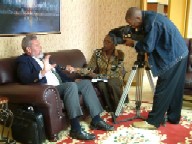 |
A television crew interviews Paul. They only need to ask him one question to fill his allotted broadcast time. Later, after he's seen the broadcast (which I missed), Paul assures me that they edited the tape severely to make him "intelligible." |
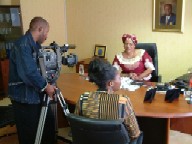 |
Margaret Mbilizi, executive director of the Bakili Muluzi Institute, gives a television interview. |
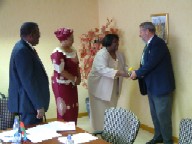 |
The board of trustees gives Paul a small token of their appreciation. |
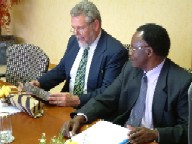 |
Paul and Dunstan admire the collection of candles decorated with portraits of Malawi wildlife. |
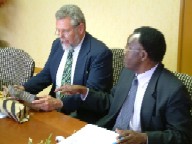 |
"Sure, they gave you candles, but they didn't give you any matches to light them with! I think we know what that means!" |
|